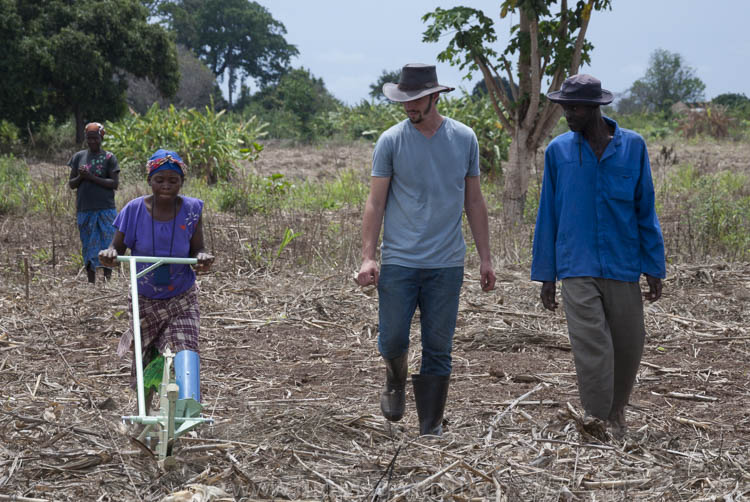Haraka Planter Development
 A key part of the work that Growing Nations carry out at their demonstration farm is research & development of Conservation Agriculture (CA) techniques and best practices which can help farmers across Lesotho and beyond. This includes the testing and development of equipment.
A key part of the work that Growing Nations carry out at their demonstration farm is research & development of Conservation Agriculture (CA) techniques and best practices which can help farmers across Lesotho and beyond. This includes the testing and development of equipment.
Between 2013 & 2015 Growing Nations developed a 'No-till Rotary Punch Planter for Women' in conjunction with Eden Equip with funding from the Bill & Melinda Gates Foundation.
The objective of the planter was to adhere to Conservation Agriculture (CA) or No-till principles and be designed specifically to enable women in Africa to take control of the planting of their own fields, reducing time spent planting, the effort required to plant using CA techniques and allowing timely planting of crops.
The idea of a rotary punch planter is not a new one, with a similar product having been product having been designed in Malawi in the 1970's and commecially produced for a short period in the 1980's/90's in Nigeria. The early designs of the planter were however beset with problems surrounding the seed metering unit and planters were never produced on a large scale across Africa.
During the 2 year project a prototype planter was produced & adapted, before being tested in 7 different countries across southern Africa. Further changes were made to the planter in August/September 2014 and 50 planters were produced at the end of the project to test the market. The planter meets the majority of the objectives set in that it is usable by women farmers, culturally acceptable across Southern Africa (for men & women), allows women to take control of their own fields and reduces the reliance on others (men & tractor/plough/oxen owners). It is easy to use & maintain and significantly reduces planting time and effort, allowing farmers to adopt CA methods more easily.
The feedback received from farmers has been very positive and since the 2 year funding for the project finished in 2015, Eden Equip have further refined the planter & it is now available for purchase.
The story of the planter development is shown in images & quotes below.
Initial Designs P1-P3 Pre-field testing




Field Testing in 7 Southern African Countries - P4 Planter








Farmer results & Quotes




“The main advantage of the Haraka Planter is that it saves time. You can plant the entire field within a short period of time...It is also important because women have family chores, so with the use of Haraka it is possible to work in the fields and attend family chores right on time.” Masebefola Makaba, Lesotho.

“In the absence of the husband women can find it difficult to work their fields especially if they do not have cattle or money to hire people to plough their land. With the Haraka Planter she can turn to other women for help or plant her fields herself as it only needs minimal effort.”
Mabataung Putsoa, Lesotho.

“It does not require much effort, everybody can do it, which reduces dependency on many other factors. People can overcome poverty even if they own a small land for example I can produce right in my yard if I don’t have a field and I can live through that.”
Mamohloli Bohloko, Lesotho.
P5 Planter Delivery & Distribution
Towards the end of the project 50 planters were produced for demonstration purposes and for sale to farmers in Lesotho to test the market. These planters were all sold and as a result a further 50 planters were ordered and are currently available for sale at Growing Nations.



Collaboration with others
During the project Growing Nations also worked with a team from Brazil who were working on a similar planter project. Their visit to Growing Nations provided them with valuable farmer feedback and also helped Growing Nations with changes to the seeding mechanism on the Haraka Planter too.



